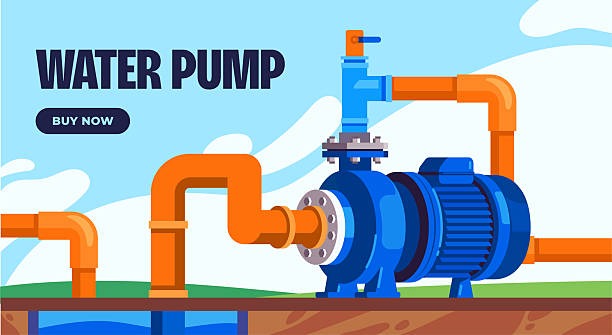Key Takeaways
- Roper pumps ensure safe, efficient fluid handling in demanding industrial settings.
- Proper pump selection depends on fluid type, flow rate, system compatibility, and environmental conditions.
- Gear, progressive cavity, and sliding vane pumps are used for each suit’s specific applications.
- Focus on efficiency, durability, and maintenance to maximize lifespan.
- Custom features and compliance with safety standards improve performance and reliability.
Understanding Roper Pumps and Their Applications
Industrial pumps are the workhorses behind countless processes in industries ranging from food processing and chemicals to oil and gas. These devices serve a critical function: transporting liquids and slurries safely and efficiently, even in the harshest industrial conditions. As systems and requirements diversify, choosing the right pump solution becomes key to operational success. Ensuring optimal efficiency and safety in these demanding environments often hinges on leveraging roper industrial pumps and Gardner Denver blowers, which are well-known for their robust construction and adaptability across multiple applications.
In addition to efficiency, the role of roper pumps and blowers extends to safety by providing leak-proof fluid transfer, reliable air or gas handling, and reducing contamination risks that could disrupt production or violate industry standards. By controlling the movement of hazardous or sensitive materials, these solutions help companies maintain compliance and minimize downtime.
Key Considerations Before Selecting an Industrial Pump
The foundation of choosing the right pump is carefully evaluating your system requirements. Flow rate demands, fluid viscosity, material compatibility, and abrasive or corrosive elements influence the ideal pump. Misjudging these factors can reduce efficiency, excessive wear, and costly breakdowns.
Compatibility with your existing plant equipment further influences selection. Whether upgrading or retrofitting, ensuring new pumps integrate seamlessly into established systems reduces installation headaches and avoids unintended bottlenecks.
Environmental considerations, such as temperature extremes, exposure to weather, or risk of explosive atmospheres, are pivotal in narrowing pump choices. Selecting a pump designed for your unique operational setting is essential for long-term dependability.
Types of Roper Pumps and Their Strengths
Roper offers a range of pump models, with gear pumps, progressive cavity pumps, and sliding vane pumps among the most recognized. Gear pumps, widely appreciated for their consistent flow and ability to handle viscous fluids, are well-suited for transferring oils, syrups, and similar media.
Progressive cavity models excel when precise flow control of shear-sensitive fluids is necessary, making them indispensable in food and chemical applications. Sliding vane pumps, on the other hand, provide superior handling of light, volatile, or thin fluids, meeting the challenges of fuel transfer and solvent processing.
Matching each pump type to your specific application improves efficiency and extends equipment lifespan by preventing overloading or misapplication.
Performance Metrics to Prioritize
When comparing pump options, focus on operational efficiency, durability, and ease of maintenance metrics. High-efficiency pumps directly translate to lower energy costs and sustainable operations. Durability ensures equipment remains reliable despite constant exposure to demanding conditions, while minimal maintenance needs help lower long-term overheads.
Real-world case studies routinely demonstrate substantial increases in plant throughput and significant reductions in unplanned downtime with the proper pump choice. For further insights, industry data compiled by the Hydraulic Institute and similar organizations provides helpful benchmarking.
Longevity and Maintenance Demands
Consistent maintenance is essential to protect your investment in industrial pumps. Skipping routine inspections or fluid changes can accelerate wear, lead to catastrophic failure, and disrupt your production schedule. Best practices include adhering to manufacturer-recommended service intervals, conducting regular performance audits, and keeping detailed maintenance logs.
When deciding whether to repair or replace a pump, consider the total cost of ownership. If repairs become frequent or the pump’s performance declines, replacement often delivers better value and reliability in the long run.
Customization Options and Special Features
Modern manufacturing facilities often face unique challenges that off-the-shelf pumps may not address. To meet the diverse requirements of various industries, Roper offers a range of customization features, such as corrosion-resistant finishes, specialized seals, or integrated control systems.
Successful customizations include food processing plants adapting pumps for sanitary standards, or petrochemical companies specifying explosion-proof motors for hazardous operations. Innovative features—such as smart monitoring, advanced energy control, and variable speed settings—further drive adoption and enhance productivity in forward-thinking organizations.
Regulatory Standards and Safety Compliance
Industrial pumps used in U.S. facilities must comply with regulatory frameworks such as OSHA, EPA, and relevant ISO standards. These requirements ensure worker safety, environmental stewardship, and product integrity. Adhering to established norms, including vibration and noise limits, minimizes workplace hazards and maintains licensing eligibility.
Safety compliance influences daily procedures, from maintenance schedules to emergency shutdown protocols.
Step-by-Step Guide to Choosing the Best Roper Pump
- Define your process requirements clearly: Identify flow rate, pressure, and fluid characteristics.
- Assess compatibility with current infrastructure: Ensure integration and minimize modification costs.
- Review supplier recommendations: Verify the pump suits your safety, reliability, and compliance needs.
- Analyze total cost of ownership: Evaluate long-term energy, maintenance, and replacement costs.
- Ask key questions: What warranty terms are provided? What service agreements exist for emergency repairs?
- Engage an expert: Where system complexity or risk justifies it, consult with an industrial pump specialist.
Ensuring Long-Term Value and Reliability
Choosing the right Roper pump involves careful research, alignment with operational goals, and attention to compliance. Begin with a comprehensive needs assessment, prioritize reliability and maintenance, and leverage customizable features to maximize performance. By integrating robust, well-selected pumps into your process, you’ll see long-term gains in efficiency, compliance, and equipment durability. Staying vigilant with maintenance and adapting to industry advances will keep your facility ahead of the curve.





Leave a Reply